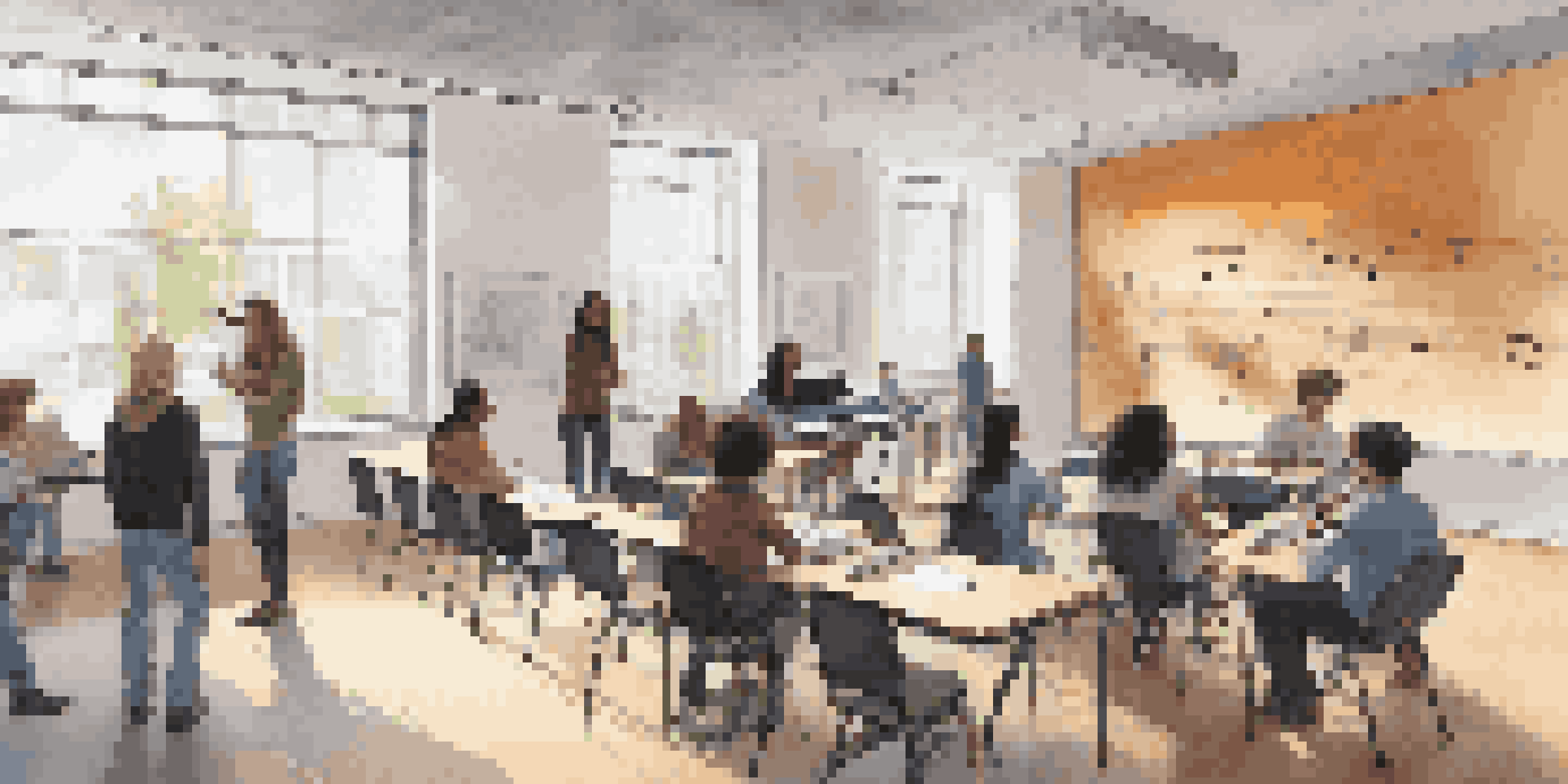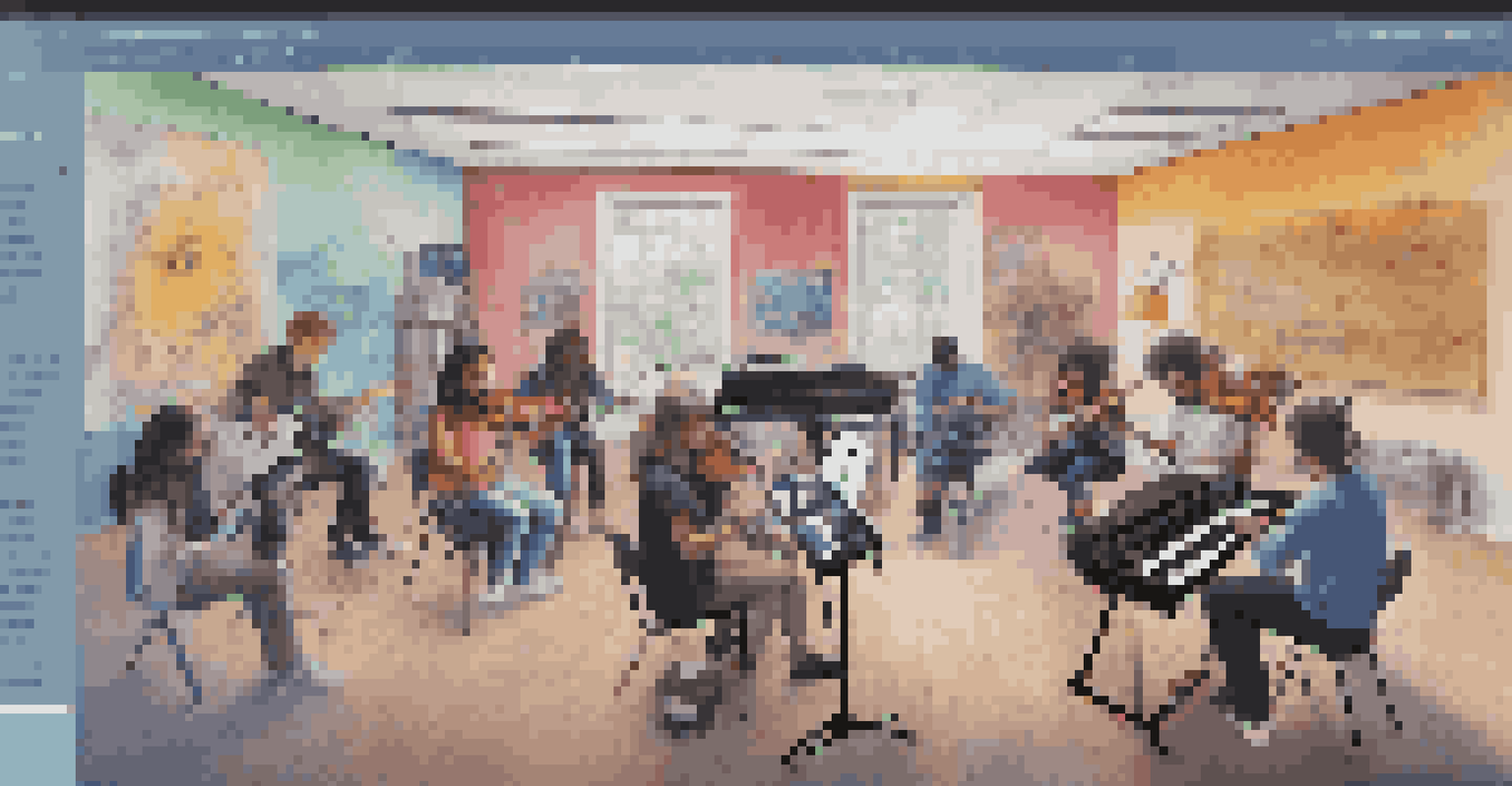Enhancing Music Education through Artificial Intelligence Tools

The Role of AI in Modern Music Education
Artificial Intelligence is becoming a game changer in music education, reshaping how students learn and practice. By offering personalized learning experiences, AI can adapt to each student's unique needs, ensuring that no one falls behind. This technology not only assists in skill development but also enhances creativity, allowing students to explore new musical ideas.
Music education should be for everyone, everywhere, and AI is making that possible.
Imagine a virtual tutor that analyzes your playing style and provides real-time feedback. This is now possible with AI-driven tools that can assess technique and even suggest improvements. Such capabilities create a more dynamic and engaging learning environment, transforming traditional music lessons into interactive experiences.
As AI continues to evolve, its applications in music education are expanding. From composition assistance to practice tracking, the integration of AI tools is making music education more accessible and enjoyable for everyone, regardless of their starting point.
Personalized Learning Experiences with AI
One of the standout benefits of AI in music education is its ability to tailor learning experiences to individual students. Unlike traditional methods that often follow a one-size-fits-all approach, AI tools can analyze a student's progress and adapt lessons accordingly. This means that if a student struggles with a specific technique, the AI can provide additional resources and exercises to help them improve.

For instance, platforms like SmartMusic use AI to create custom practice sessions based on the user's current skill level and learning pace. This level of personalization keeps students engaged and motivated, as they can see tangible progress in their abilities. Moreover, it fosters a more positive attitude towards learning, as students feel supported rather than overwhelmed.
AI Personalizes Music Learning
AI tools tailor music education to individual student needs, enhancing engagement and motivation.
As we look to the future, the potential for even greater personalization is exciting. With advancements in machine learning, AI can predict areas where students may struggle, preemptively offering challenges that match their skill level and learning style.
AI-Powered Feedback Mechanisms
Feedback is crucial in music education, and AI tools are revolutionizing how students receive it. By utilizing audio analysis technology, AI can provide instant feedback on performance, highlighting areas of strength and areas for improvement. This immediate response allows students to make adjustments in real-time, enhancing their practice sessions.
The future of music education is not just about learning notes; it's about fostering creativity and collaboration through innovative tools.
For example, tools like Yousician use AI to listen to students play and give them instant feedback on their accuracy and timing. This not only boosts confidence but also helps students develop their ear for music. The more they practice with AI assistance, the more proficient they become, as they learn to self-correct based on the feedback received.
Additionally, AI can compile performance data over time, giving students and teachers valuable insights into progress. This data-driven approach allows for more informed decisions regarding future lesson plans, ensuring that students are always challenged appropriately.
Fostering Creativity through AI Tools
Creativity is at the heart of music, and AI tools are enabling students to explore their creative potential like never before. With applications that assist in composition, students can experiment with different musical styles and genres. AI can generate chord progressions, melodies, and even full arrangements, serving as a collaborative partner in the creative process.
Imagine a student struggling with writer's block, who turns to an AI tool for inspiration. By providing suggestions based on the student's previous work, AI can help spark new ideas and encourage experimentation. This collaborative approach not only enhances creativity but also builds confidence as students learn to trust their artistic instincts.
Instant Feedback Enhances Practice
AI-driven feedback mechanisms provide real-time insights, allowing students to improve their performance effectively.
Moreover, these tools can introduce students to diverse musical influences, broadening their horizons. By analyzing various genres and styles, students can incorporate elements into their own compositions, fostering a richer understanding of music as an art form.
Accessibility of Music Education through AI
One of the most significant impacts of AI in music education is its ability to make learning accessible to a wider audience. Traditionally, music education has been limited by geographical and financial barriers, but AI tools are breaking down those walls. With online platforms and apps, students can access high-quality music education from anywhere in the world.
For instance, free or low-cost AI-driven music apps provide resources that were once only available to those who could afford private lessons. This democratization of music education allows more individuals to explore their musical talents, regardless of their background. The sense of community and shared learning experiences also grows as students from different corners of the globe connect over their love for music.
As technology progresses, the potential for even more inclusive educational resources continues to rise. AI can help bridge the gap for students with disabilities, offering tailored solutions that cater to various learning needs and styles.
Collaborative Learning with AI in Music Classrooms
AI tools are not just about individual learning; they also foster collaboration among students. With features that allow users to share compositions and provide feedback on each other's work, AI creates a community of learners. This collaborative aspect enhances the learning experience, as students can learn from one another and build on each other's ideas.
For example, platforms like BandLab enable students to work together on projects, regardless of their physical location. They can record, edit, and share music in real-time, promoting teamwork and communication skills. Such collaborative projects can lead to innovative results that a single student may not have achieved alone.
AI Fosters Creative Collaboration
AI tools encourage collaborative learning, enabling students to share ideas and work together on musical projects.
Ultimately, collaborative learning through AI prepares students for the real-world music industry, where teamwork and collaboration are essential. By engaging with their peers in a creative environment, students develop essential skills that will serve them well in their future musical endeavors.
The Future of Music Education with AI Innovations
As we look ahead, the future of music education is poised for exciting innovations driven by AI. With ongoing advancements in technology, we can expect even more sophisticated tools that enhance learning and creativity. Imagine AI that can analyze not just performance but emotional expression, offering insights into how students can convey feeling through their music.
Moreover, as AI continues to learn from interactions with students, its ability to provide personalized experiences will only improve. This means that music education can become even more tailored, catering to the diverse needs of students around the globe. The possibilities are virtually limitless, suggesting a bright future for aspiring musicians.

By embracing these innovations, educators can prepare students for a rapidly changing musical landscape. As they learn to adapt to new technologies, students will be better equipped to navigate the complexities of the music industry and thrive in their musical journeys.